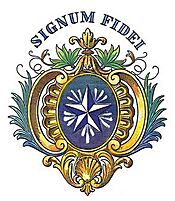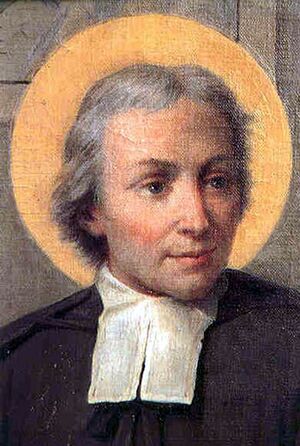De La Salle Brothers facts for kids
 |
|
| Abbreviation | FSC |
|---|---|
| Nickname | Lasallians |
| Formation | 1725 |
| Founder | Jean-Baptiste de la Salle |
| Founded at | Reims, Kingdom of France |
| Type | Lay religious congregation of pontifical right (for men) |
| Purpose | Education |
| Headquarters | Via Aurelia 476, Rome, Italy |
|
Region
|
Worldwide |
| Services | Education |
|
Membership
|
2,883 members as of 2023 |
|
Secretary General
|
Antxon Andueza |
|
Superior General
|
Armin A. Luistro |
|
Vicar General
|
Carlos Gabriel Gómez Restrepo |
|
Motto
|
Latin: Signum Fidei English: Sign of Faith |
|
Main organ
|
Generalate |
|
Parent organization
|
Catholic Church |
The De La Salle Brothers are a group of men in the Catholic Church who dedicate their lives to teaching. Their official name is the Institute of the Brothers of the Christian Schools. They are also known as Lasallians or Christian Brothers. The group was founded in France by a priest named Jean-Baptiste de La Salle. Today, their main office is in Rome, Italy.
Members of the order are called Brothers. They use the letters FSC after their names to show they are part of the group. As of 2023, there were 2,883 Brothers. They help run over 1,100 schools and education centers in 78 countries. These schools teach more than a million students.
Contents
The Story of the Brothers
How It All Began
The story of the De La Salle Brothers starts with their founder, Jean-Baptiste de La Salle. He was born in France in 1651. In 1679, he met a teacher named Adrian Nyel. Nyel wanted to open free schools for poor boys in the city of Reims, and he asked La Salle for help.
La Salle became very involved in this mission. He realized that many teachers were not well-trained. He started a school in Paris in 1694 to train teachers. The men who joined him became the first Brothers. They promised to stay together and serve their communities. This was different from other religious groups where members often lived alone in monasteries.
La Salle spent his life helping to educate poor children. After he died in 1719, his work continued. In 1725, the Pope officially recognized the group as the "Brothers of the Christian Schools."
Becoming a Saint
Because of his great work, Jean-Baptiste de La Salle was made a saint in 1900. In 1950, Pope Pius XII named him the "Special Patron of All Teachers of Youth." This is a special honor that recognizes his importance to education.
Growth and Challenges
The order grew quickly in France. However, during the French Revolution, the group was temporarily shut down in 1790. A few years later, in 1804, Napoleon I brought the Brothers back. Since then, they have opened schools all over the world, in Europe, Africa, America, Asia, and Australia.
The Brothers' Mission Today
What the Brothers Do
The main goal of the De La Salle Brothers is to provide a "human and Christian education," especially for the poor. They believe in five key ideas:
- Faith in the presence of God.
- Caring for the poor and working for social justice.
- Building communities where everyone feels included.
- Respecting all people.
- Providing high-quality education.
As of 2023, the Brothers and their lay partners (non-religious staff) were teaching over 1.1 million students worldwide.
How the Order is Organized
The Brothers are part of the Catholic Church. When they join the order, they take vows, which are special promises of poverty, chastity (living a pure life), and obedience.
The headquarters, called the Generalate, is in Rome. The leader of the entire order is called the Superior General. The order is divided into five regions around the world:
- North America (RELAN)
- Asia and Oceania (PARC)
- Europe and the Mediterranean (RELEM)
- Africa (RELAF)
- Latin America (RELAL)
Famous Lasallian Saints
The Catholic Church has recognized several De La Salle Brothers as saints for their holy lives.
- Jean-Baptiste de La Salle: The founder of the order.
- Bénilde Romançon: A French schoolteacher known for his simple and dedicated life.
- Miguel Febres Cordero: A Brother from Ecuador who was a respected writer and teacher.
- Mutien-Marie Wiaux: A Belgian teacher known for his patience and kindness to students.
- Salomone Leclercq, Cirilo Bertrán and 7 Companions, and Jaime Hilario Barbal: Brothers who became martyrs, meaning they died for their faith.
See also
- List of Lasallian educational institutions
- Parochial patronage
 | Claudette Colvin |
 | Myrlie Evers-Williams |
 | Alberta Odell Jones |


